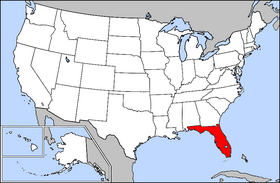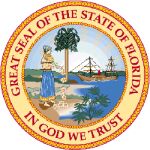Florida
- Alternate meanings: Florida (disambiguation)
| |||||||
| State nickname | Sunshine State | ||||||
|---|---|---|---|---|---|---|---|
 Other U.S. States Other U.S. States
| |||||||
| Capital | Tallahassee | ||||||
| Largest City | Miami | ||||||
| Governor | Jeb Bush | ||||||
| |||||||
| |||||||
| Admittance into Union | March 3, 1845 (27th | ||||||
| Time zone | Eastern: UTC-5/-4 Central: UTC-6/-5 All but western panhandle is Eastern | ||||||
| Latitude | 24°30'N to 31°N | ||||||
| Longitude | 79°48'W to 87°38'W | ||||||
| Width | 260 km | ||||||
| Length | 800 km | ||||||
| |||||||
| ISO 3166-2 | US-FL | ||||||
Florida is a southern state in the United States. It is known as the Sunshine State. "Florida" is a Spanish adjective which means "flowery". It was discovered by Spanish explorers during the Easter season, which is called Pascua Florida in Spanish. The U.S. Postal abbreviation is FL.
USS Florida was named in honor of this state.
History
Main article: History of Florida
Archaelogical finds indicate that Florida had been inhabited for many thousands of years prior to any European settlements. Spaniards first arrived in 1513 and lay claim to a large, imprecisely defined area extending from about modern day Gainesville northward to the Carolinas, which they called La Florida. Over the following century, the Spanish and French both established settlements in Florida, with varying degrees of success. The area of Florida diminished with the establishment of British colonies to the north and French colonies to the west. Control of parts of Florida passed among Spanish, British, and American control. Spain finally ceded Florida to the United States with the Adams-Onís Treaty in 1819, in exchange for the US renouncing any claims on Texas. On March 3, 1845, Florida became the 27th state of the United States of America. Today, Florida is the fourth most populous state in the Union.
Law and Government
The Florida Legislature has a Senate of 40 members and a House of 120 members. The current governor is Republican Jeb Bush, brother of President George W. Bush.
Though Florida has traditionally been a Democratic state, in recent years explosive population growth has brought with it many Republicans, leaving the state approximately evenly split between the two parties. As such, and because of its high population and large number of electoral votes, Florida is considered by political analysts to be a key swing state in Presidential elections.
In Miami, the liberal Democrats vie for control with wealthy Cuban right wing Republicans and their business allies. Tampa was once a hotbed of Democratic union/Mafia support, but has reversed polarity completely in recent years, and is now governed by heavily pro-business Republicans. Outside of liberal Miami-Dade County, the Florida Democratic Party tends to be socially conservative and heavily associated with the good ol' boy network. See: List of Florida Governors
Taxation
Florida is one of the nine states which does not impose personal income tax (list of others). The state sales tax rate is 6 percent, and use tax of 6 percent is due on purchases made out of state and brought into Florida within 6 months of the purchase date. Additionally, some counties are authorized to levy a discretionary sales surtax on most transactions that are subject to sales and use tax.
Geography
See: List of counties in Florida
Florida consists of a panhandle extending along the northern Gulf of Mexico and a large peninsula with the Atlantic Ocean as its eastern border and the Gulf of Mexico as its western border. It is bordered on the north by the states of Georgia and Alabama. It is near the Bahamas, Cuba, Haiti, and other countries in the Caribbean.
At 345 feet (105 metres) above sea level, Britton Hill is the highest point in Florida (it's also the lowest state highpoint.)
Economy
Florida's economy is heavily based on tourism. Warm weather most of the year and many miles of pristine beaches provide a thriving vacation spot for travelers from around the world. The large Walt Disney World theme park and resort complex, located near Orlando, drives the economy of that area, along with more recent entries into the theme park arena such as the Universal Orlando Resort. The great amount of sales tax revenue is what allows the state to be one of the few to not levy a personal income tax. Other major industries include citrus fruit and juice production, banking, and phosphate mining.
Demographics
As of the 2000 census, the state had a population of 15,982,378.
Important cities and towns
|
Population > 1,000,000 (urbanized area) Population > 100,000 (urbanized area) |
Population > 10,000 (urbanized area)
|
Education
Despite the tremendous amount of tax revenue generated by tourism, Florida's public education system is abysmal, with state public schools consistently ranking last or near last in national surveys. With teachers' salaries among the lowest in the country, many competent educators choose to go elsewhere or work in private industry rather than teach. Governor Jeb Bush has been criticized by Florida educators for a program, widely regarded as counterproductive, that penalizes underperforming schools (as indicated by standardized tests) with fewer funding dollars.
In 2000, Governor Bush and the state legislature acted to abolish the Board of Regents that governed the State University System of Florida. Instead, each public university is now controlled by its own Board of Trustees who are directly appointed by the governor. The appointees so far have been overwhelmingly Republican. [1] In 2002, Democratic Senator Bob Graham started a ballot referendum designed to revert to the Board of Regents system.
Colleges and universities
Sports
Professional sports teams in Florida
Spring training
Florida is an extremely popular location for Major League Baseball spring training. Florida hosts the following major league teams for spring training:
- New York Yankees in Tampa
- Pittsburgh Pirates in Bradenton
- Detroit Tigers in Lakeland
Minor League teams
Florida also hosts the following minor league baseball teams:
